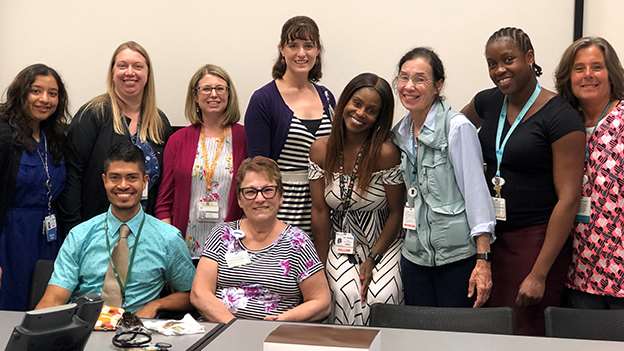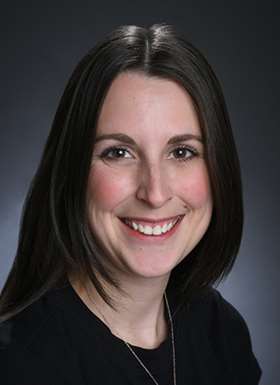Medical College of Wisconsin Pediatrics Adolescent Medicine Fellowship Program
The MCW Adolescent Medicine Fellowship is an ACGME accredited three-year program open to physicians trained in Pediatrics, Internal Medicine and Family Medicine. Our fellows train with experts in Adolescent Medicine as well as Pediatric and Adolescent Gynecology, as well as specialists in Psychiatry, Psychology, Sports Medicine, Endocrinology, Toxicology, Child Advocacy, and a variety of other fields. Upon successful completion of fellowship, candidates are eligible to take the Adolescent Medicine Boards Exam. Our graduates have gone on to pursue academic careers at institutions across the United States, as well as internationally.

A Message from Our Program Director | Jen Makrides, MD, MA, MHS
We are thrilled you are joining the Adolescent Medicine community and considering us to be your “home” as you build a national – or international – network of colleagues in the field.
We offer fellows a diversity of clinical training opportunities in a range of settings. Additionally, we work with each of our trainees to develop specialized clinical and non-clinical learning opportunities to meet their personal career goals. I meet with each fellow before they start to identify specialized interests – both clinical and academic – so we can personalize their schedule and prioritize key learning opportunities. For some, this has included Clinician Educator training through the MCW Kern institute; tailored clinical electives; taking on a leadership role in resident education; networking with research mentors; or identifying extra-institutional learning opportunities of interest.
Recognizing that the community of Adolescent Medicine is broader than one discipline or one institution, we aim for our fellows to develop a national and international network before graduation. Through our multi-institutional learning consortium (FAMLI), the Society for Adolescent Health and Medicine (SAHM), the North American Society for Pediatric and Adolescent Gynecology (NASPAG), the American Academy of Pediatrics, and other professional associations, our fellows build the foundation for lifelong learning, scholarship and partnerships.
As an Adolescent Medicine fellow you will...
- Work with skilled Adolescent Medicine faculty and other subspecialists to master the clinical skills you need to care for adolescents and young adults. These include: Primary Care, Eating Disorders, Gynecological disorders, LARC placement and removal, Mental and Behavioral Health, Substance Use Disorders, Sport Medicine, College Health, and more. Interested fellows may have opportunities to care for at-risk youth, trafficked youth and gender diverse youth. Additionally, program leadership is supportive of expanding elective offerings in areas relevant to Adolescent Health and Medicine.
- Work with an interdisciplinary team of providers including physicians, advanced practice providers, RNs, MAs, social workers, psychologists, dieticians and others.
- Work with a diverse patient population and gain cultural competency skills.
- Build a continuity panel as the primary provider for patients under the guidance of an expert provider.
- Work with faculty mentors to develop a well-rounded and unique scholarly project for publication and presentation at a national conference.
- Educate residents and medical students that rotate through the specialty clinics.
- Lead and participate in didactic education.
About Our Institutions
Medical College of Wisconsin (MCW)
The Medical College of Wisconsin brings together the most inquisitive minds in science, medicine, education and community engagement to solve the toughest challenges in health and society today. Academic medicine is at the core, where scientists, physicians and students work hand-in-hand with the community to ask the questions no one else is and fuel the continuous cycle of knowledge that’s shaping the future of medicine.
Children’s Wisconsin
Children’s Wisconsin is the region’s only independent health care system dedicated solely to the health and well-being of children. We offer a wide range of care and support for children of all ages. Our services include medical care, dental care, child and family counseling, foster care, adoption, social services, child advocacy and injury prevention.
About Our Fellowship
The Division of Adolescent Medicine offers a 3-year, ACGME-accredited fellowship program. Our fellows have dedicated time for clinical learning in the outpatient and inpatient settings, and scholarly time that includes didactics, research and QI work. The ratio of various training time evolves over the three years to support the development of strong clinical knowledge while building research and scholarship skills for an academic medical career.
The field of Adolescent Medicine is important because I feel that teenagers are often the forgotten population of Pediatrics. Adolescence is a critical time of life and as their physician, we possess the ability to address the unique physical, psychological and social needs of teens and can prepare them for a healthy adulthood."
Dr. Alexandria Holliday, 2021 Fellowship Graduate
Meet Our Fellows

Kelli-Ann Corrao, MD
Adolescent Medicine Fellow, Third Year
Medical School: Saint Louis University; Residency: University of Nebraska Medical Center/Creighton University

Tara Gibbons, MD
Adolescent Medicine Fellow, Second Year
Medical School: Howard University; Residency: Loyola University Medical Center

Aiden Sperry, MD
Adolescent Medicine Fellow, First Year
Medical School: Tulane University School of Medicine; Residency: Children’s Hospital-Los Angeles
Adolescent Medicine Fellowship Leaders

Jen Makrides, MD, MA, MHS
Assistant Professor; Director, Adolescent Medicine Fellowship Program

Kairee Larson
Education Program Coordinator II

Megan Kidd, MHA
Administrative Assistant Sr
Fellowship Program Contact
Kairee Larson
Education Program Coordinator II
kllarson@mcw.edu
Megan Kidd
Administrative Assistant Sr
mekidd@mcw.edu


